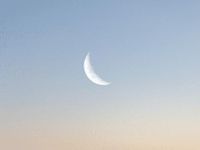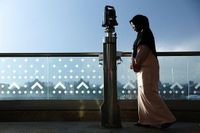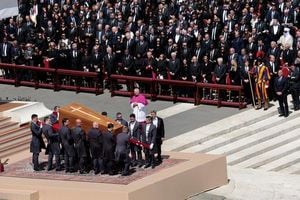The United Arab Emirates is gearing up for the festive season as the UAE Council for Fatwa has officially called upon Muslims across the nation to observe the crescent moon of Shawwal on the evening of Saturday, March 29, 2025. This sighting will mark the end of Ramadan and the beginning of Eid Al Fitr celebrations. Residents who spot the crescent are encouraged to report their sightings to the designated committee, which plays a crucial role in determining the start of the next month in the Islamic calendar.
As anticipation builds for Eid Al Fitr, the UAE's Astronomy Centre has issued a cautionary note regarding the visibility of the crescent moon. According to their analysis, sighting the crescent may not be feasible in many regions worldwide on that date. The centre stated, "Sighting the crescent on this day will be impossible in the eastern parts of the world and not possible in the rest of the Arab and Islamic world using any observation methods, including the naked eye, telescopes, and astrophotography techniques." This suggests that the holy month of Ramadan is likely to span a full 30 days, leading to March 30 being the last day of fasting.
In light of these predictions, the first day of Eid is anticipated to fall on Monday, March 31, 2025. The UAE government has also announced public holidays to coincide with the celebrations. The Eid holidays for both public and private sectors will begin on Shawwal 1 and conclude on Shawwal 3, 1446 AH, ensuring that all employees receive equal time off during this festive period.
On March 17, the Federal Authority for Government Human Resources confirmed that public sector workers would enjoy a holiday from Sunday, March 30, through Tuesday, April 1, with an additional day off on Wednesday, April 2, if Ramadan lasts for the full 30 days. Similarly, the Ministry of Human Resources and Emiratisation announced that private sector employees would also have at least Sunday through Tuesday off, with Wednesday included if Ramadan extends to 30 days.
The significance of moon sightings extends beyond just the observance of Ramadan's conclusion. It plays a pivotal role in the Islamic calendar, which is lunar-based, contrasting with the solar-based Gregorian calendar. Each month in the Islamic calendar can vary between 29 and 30 days, depending on the moon's visibility. If the crescent moon is not sighted by the 28th day, the month is completed with 30 days. Factors such as weather conditions, including cloud cover, can hinder the ability to see the crescent.
As the Eid Al Fitr holiday approaches, Dubai Customs has been proactive in preparing for the influx of travelers through the city’s airports. The agency has developed a specialized operational plan to manage peak travel times effectively. Khalid Al-Mouazen, Manager of Terminal 3 at Dubai Customs, emphasized the importance of seamless customs procedures during this busy period, highlighting that additional inspection officers will be deployed to ensure efficiency.
Dubai Customs is also collaborating closely with major partners such as Dubai Airports and Emirates Airline to facilitate smooth operations. Daily meetings are held to streamline processes, allowing for real-time adjustments to accommodate varying passenger volumes. This coordination is crucial, especially with the expected increase in travelers returning from Umrah, a pilgrimage that many undertake during the last days of Ramadan.
To enhance the travel experience, Dubai Customs has arranged for special welcome services and symbolic gifts for passengers arriving during Eid. This initiative reflects the city’s commitment to providing a warm and festive atmosphere for visitors. Additionally, the iDeclare (Smart Disclosure) program has been implemented to simplify customs declarations for travelers. This advanced digital solution aligns with Dubai’s vision of hassle-free travel, allowing incoming passengers to pre-declare their personal belongings, which can significantly reduce processing times at customs.
The iDeclare mobile application enables travelers to initiate customs clearance requests even before their arrival, aiming to cut processing times at the red channel to under four minutes. Moreover, Dubai Customs has made available a Traveler’s Customs Guide on its official website, offering essential information on baggage declaration requirements, prohibited items, duty-free allowances, and customs duties for excess baggage.
As the UAE prepares for Eid Al Fitr, the excitement among residents and travelers alike is palpable. With the potential for a long holiday weekend, families are looking forward to celebrating this significant occasion together. Whether it’s through festive meals, community gatherings, or simply enjoying time off work, the spirit of Eid is set to bring joy to many.
The upcoming Eid Al Fitr celebrations are not just a time of festivity but also a moment for reflection and gratitude. As families come together to mark the end of Ramadan, the importance of community and shared experiences takes center stage. The call for moon sightings and the subsequent celebrations serve as a reminder of the rich cultural and religious traditions that are cherished in the UAE and beyond.






